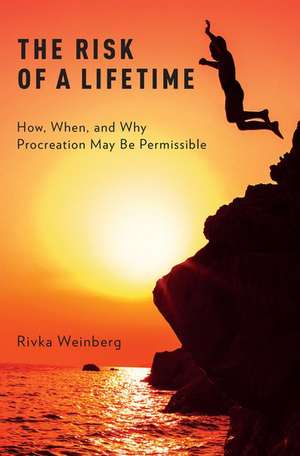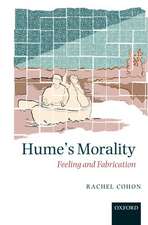The Risk of a Lifetime: How, When, and Why Procreation May Be Permissible
Autor Rivka Weinbergen Limba Engleză Paperback – 3 aug 2017
| Toate formatele și edițiile | Preț | Express |
|---|---|---|
| Paperback (1) | 338.64 lei 31-37 zile | |
| Oxford University Press – 3 aug 2017 | 338.64 lei 31-37 zile | |
| Hardback (1) | 526.25 lei 31-37 zile | |
| Oxford University Press – 7 ian 2016 | 526.25 lei 31-37 zile |
Preț: 338.64 lei
Preț vechi: 386.07 lei
-12% Nou
Puncte Express: 508
Preț estimativ în valută:
64.80€ • 67.84$ • 53.62£
64.80€ • 67.84$ • 53.62£
Carte tipărită la comandă
Livrare economică 25-31 martie
Preluare comenzi: 021 569.72.76
Specificații
ISBN-13: 9780190695996
ISBN-10: 0190695994
Pagini: 280
Dimensiuni: 140 x 210 x 16 mm
Greutate: 0.35 kg
Editura: Oxford University Press
Colecția OUP USA
Locul publicării:New York, United States
ISBN-10: 0190695994
Pagini: 280
Dimensiuni: 140 x 210 x 16 mm
Greutate: 0.35 kg
Editura: Oxford University Press
Colecția OUP USA
Locul publicării:New York, United States
Recenzii
This book will certainly appeal to a wide audience. Each of the six chapters can be read on its own, independent from the others...the reader will certainly not be disappointed by her novel perspective on procreation.
The reader will certainly not be disappointed by her novel perspective on procreation.
This is an intereting and useful book
Those who follow the field will no doubt find these wide-ranging discussions fruitful
In his Life of Johnson, Boswell cites 'Madame de Sévigné, who, though she had many enjoyments, felt with delicate sensibility the prevalence of misery' and 'complains of the task of existence having been imposed upon her without her consent.' Given that no one can consent to the risks of misery inherent in coming into existence, this complaint raises the question of when it can be permissible to expose people to these risks by causing them to exist. This is the question addressed in Rivka Weinberg's fascinating and carefully argued book. Written with flair and comic wit that is unusual in philosophy, The Risk of a Lifetime defends a range of bold and controversial judgments about the morality of procreation."
Rivka Weinberg rightly recognizes that life is a risk rather than a gift. Yet she thinks that it is a risk that is sometimes permissibly imposed. She provides an account of the conditions under which this is the case. En route to this conclusion she argues against both those who think that procreation is (almost) always wrong and those who say that it is (almost) always permissible. She writes with clarity, verve and humour, making the The Risk of a Lifetime a risk-free read even for those who will disagree with either her pessimistic inclinations or her relatively optimistic conclusions about the permissibility of procreation."
Weinberg's The Risk of a Lifetime treats underappreciated ethical issues of procreation with philosophical intelligence, insight, and flair."
...a well-argued, insightful, and lively discussion of the issues surrounding this underappreciated topic.
Weinberg's The Risk of a Lifetime is a must-read for anyone interested in procreative ethics generally or in understanding how a contractualist approach might be applied in the context of procreative ethics. Moreover, I can't think of a recent book that would be more valuable, more fun, or more engaging for students
The reader will certainly not be disappointed by her novel perspective on procreation.
This is an intereting and useful book
Those who follow the field will no doubt find these wide-ranging discussions fruitful
In his Life of Johnson, Boswell cites 'Madame de Sévigné, who, though she had many enjoyments, felt with delicate sensibility the prevalence of misery' and 'complains of the task of existence having been imposed upon her without her consent.' Given that no one can consent to the risks of misery inherent in coming into existence, this complaint raises the question of when it can be permissible to expose people to these risks by causing them to exist. This is the question addressed in Rivka Weinberg's fascinating and carefully argued book. Written with flair and comic wit that is unusual in philosophy, The Risk of a Lifetime defends a range of bold and controversial judgments about the morality of procreation."
Rivka Weinberg rightly recognizes that life is a risk rather than a gift. Yet she thinks that it is a risk that is sometimes permissibly imposed. She provides an account of the conditions under which this is the case. En route to this conclusion she argues against both those who think that procreation is (almost) always wrong and those who say that it is (almost) always permissible. She writes with clarity, verve and humour, making the The Risk of a Lifetime a risk-free read even for those who will disagree with either her pessimistic inclinations or her relatively optimistic conclusions about the permissibility of procreation."
Weinberg's The Risk of a Lifetime treats underappreciated ethical issues of procreation with philosophical intelligence, insight, and flair."
...a well-argued, insightful, and lively discussion of the issues surrounding this underappreciated topic.
Weinberg's The Risk of a Lifetime is a must-read for anyone interested in procreative ethics generally or in understanding how a contractualist approach might be applied in the context of procreative ethics. Moreover, I can't think of a recent book that would be more valuable, more fun, or more engaging for students
Notă biografică
Rivka Weinberg is Professor of Philosophy at Scripps College, Claremont. She received her PhD. in philosophy from the University of Michigan. As a philosopher and bioethicist, Weinberg specializes in ethical and metaphysical issues regarding birth and death.










